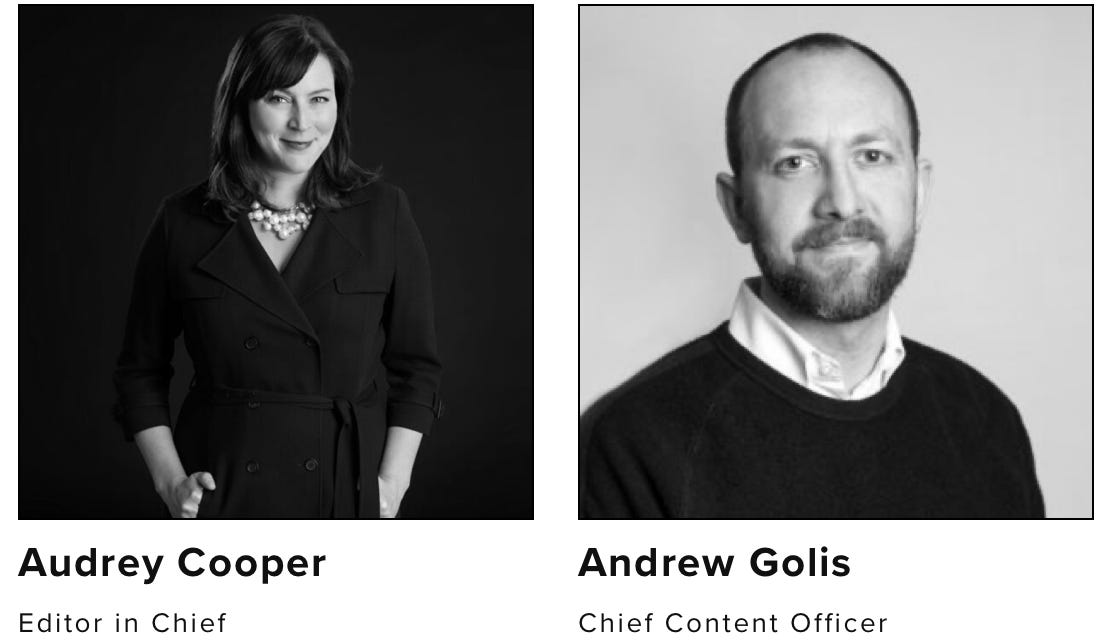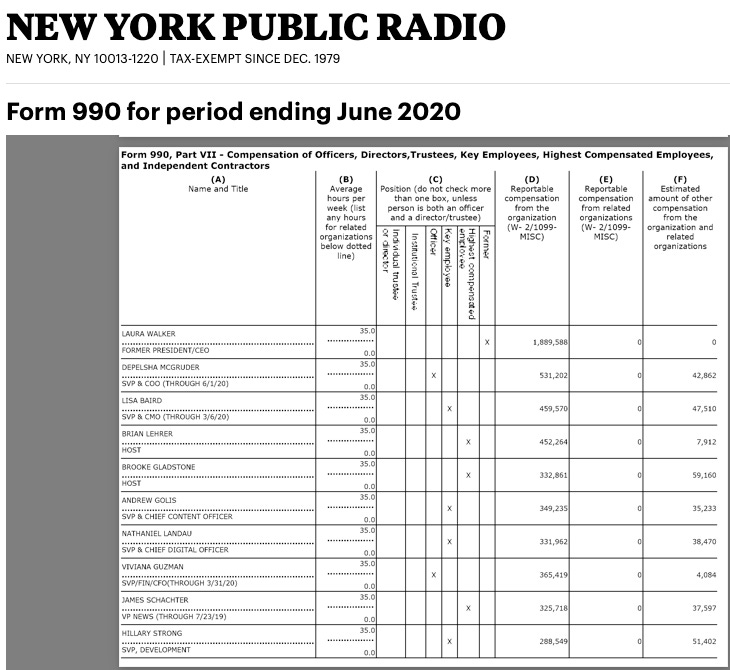WNYC Part I: Why Did New York Public Radio Hire Andrew Golis?
This Is Part One of a Three-Part Series
Hello.
Today’s story, which is the first part in a series I’m working on about WNYC, asks a simple question: why did New York Radio hire Andrew Golis to be its (extremely well-paid) Chief Content Officer? It also explains what piqued my interest in writing about the station in the first place.
Before we get started, I’ve got a real-time update, related to my reporting: in less than a month, four reporters have quit the WNYC newsroom, at least one of them citing mental health reasons. (Editor in Chief Audrey Cooper runs the newsroom; Golis is her direct boss.) When employees at WNYC learned about the fourth departure, a meeting was called by union reps. An email sent prior to the meeting read:
…it is super concerning that the station is still having problems holding onto its staff. There is also a troubling trend of people needing to go on mental health leaves.
We want to hold a meeting … to discuss some of the conditions in the newsroom that continue to contribute to people leaving and generally feeling unsupported or undervalued. In the past management has attributed retention issues to growing pains associated with the newsroom overhaul. But at this point, there are clearly ongoing issues that must be addressed.
After the meeting, a follow-up email summarized the meeting as:
a really good first step in helping each of us recognize we're not alone in our frustrations with how the newsroom is run. You're not the only one baffled by the negative feedback from managers, the overly involved and sometimes fraught editing process, the lacking news judgment of editors, the hierarchical nature of the newsroom, or arbitrary new editorial policies. You're not the only one appalled by the lack of respect from management for our colleagues who have left or gone on mental health leaves.
So that’s happening and it’s enraging.
I’ve spoken with upwards of 15 sources for my series about WNYC and am hoping to speak with more. If you are open to discussing your experiences at the station, even off the record, please reach out to me. What’s happening at WNYC deserves attention, and management should be held accountable. To reach me, hit reply on this email, find me on Twitter, or send email to skyepillsatwork@gmail.com. Happy to meet you on Signal or WhatsApp upon request.
Finally, if you value my reporting and have the means, please support my work with a paid subscription. To those of you who have signed up already, thank you so much! I will be releasing extra content from this series to paid members only.
WNYC Part I: Why Did New York Public Radio Hire Andrew Golis?
As we grow our digital portfolio and aspire to serve more audiences, I am thrilled to welcome Andrew to WNYC.
— Former New York Public Radio CEO Laura Walker
About a month ago, I covered the mess WNYC Chief Content Officer Andrew Golis created when he canceled the radio program and podcast The Takeaway (Golis is in charge of all content teams at the station, including its digital and radio newsroom and its podcast arm, WNYC Studios). That story laid out how the show’s production team had been starved of resources for years and made the argument that if the station couldn’t afford to make The Takeaway without burning people out, perhaps its CCO should have canceled it earlier, when he had the chance to do it with dignity.
Working on that story had piqued my curiosity about Golis more broadly. I was puzzled by the fact that none of my sources could point to a single content “win” at WNYC for which Golis could take honest credit. (Despite answering many queries over the past few weeks, a WNYC spokesperson has not responded to a question regarding his accomplishments at the station.) Meanwhile, Golis was being paid — according to the most recent tax filings — over half a million dollars per year. I wondered how his success was being measured by New York Public Radio.
There was also very little about him in previous reporting about the station. For example, despite loads of bad press about Editor in Chief Audrey Cooper — a woman who was hired by and reports directly to Andrew Golis — his name barely appears in two different New York Times stories about the turbulence her arrival has caused (in contrast, he contributed a delightful quote to that same paper for a story about Radiolab, a show that pre-dates his arrival at WNYC by 17 years).
Who was this guy?
I checked out his personal website, which includes musings such as:
From there, I found a Medium post about the demise of his startup This. (the period is intentional), an old Tumblr website, and links to various other social media pages.
In the 2019 NYPR press release announcing Golis’s appointment, he’s referred to as a “digital media executive” who will be responsible for leading “all content efforts—from editorial strategy and program development to the continued integration of digital and radio—across WNYC News, WNYC Radio, and WNYC Studios.” A quote from then-CEO Laura Walker glossed over his lack of radio experience by describing Golis as a man who “has worked at the forefront of digital media with deep experience working across content platforms, but also brings fluency with traditional media and podcasting.”
Evidently, Golis’s Harvard education, entrepreneurial aspirations, and a two-and-a-half year stint at Vox Media had been about all it took to convince NYPR to pay him a salary of $349,235 (and a bonus of $35,233) for his first eleven months on the job.
While that salary is $@!%ing bananas extraordinarily high, after reading the press release, I began to connect the dots. For over a decade, broadcast leaders had been fretting over digital — meaning everything from podcasts and blogs to websites and social media — eating their lunch. To make matters worse, public media was always thought to be the most at risk, due to its reliance on fundraising. In a 2016 Wall Street Journal article titled “Public Radio’s Existential Crisis,” the author warned that “the business model of NPR — the institution at the center of the public radio universe — is under threat…it faces rising competition from small and nimble podcasting companies using aggressive commercial strategies...”
In response, a bevy of public radio consultants began their pontifications. A year after the WSJ piece, one of them, Director of the Public Media Futures Forums Mark Fuerst, published a piece in Current, in which he reported that the immediate crisis had probably passed, but allowed that “the threats were all real — and still are.” To get ahead of the problem, Fuerst recommended (among other things) that public radio “be more local,” which would require “a complex, expensive reorganization of staff, acquisition of new technology and new skills and creation of new, highly valued local services…”
WYNC had already stepped toward its digital future by acquiring Gothamist, a popular news website with an irreverent tone that had been shuttered by billionaire owner Joe Ricketts after its staffers had tried to unionize. The edgy New York website and WNYC Radio had notably different vibes, but then-News-VP Jim Schachter seemed to envision a future where each property would preserve the core of what set it apart, telling the New York Times “I don’t expect the voice of Gothamist to sound like the voice of WNYC, and vice versa.”
With Gothamist in place, all WNYC needed was “a content leader who can build on our strong legacy of trusted journalism, conversation and storytelling while also charting a visionary path forward,” Walker said in the press release. “Andrew is the right person to lead the charge.”
But why was Walker so sure?
According to the announcement, Golis’s responsibilities would include:
…setting a strategy and vision for how WNYC can more powerfully tell stories across platforms, positioning WNYC News as a model of how public radio newsrooms can help reinvigorate struggling local news ecosystems across the country. … [and] crafting and driving an editorial vision that continues to innovate on audio storytelling and amplify underrepresented voices.
Did Golis have any significant prior experience that made him an obvious choice for this incredibly huge job, with things like editorial vision, audio storytelling, and rescuing local news ecosystems at its core?
I can’t say for sure, but according to sources, prior to joining WNYC, Golis was more of a business/product person than an expert in editorial content. For example, according to well-placed sources at Vox Media, it was never Golis’s job to work with creators or journalists to develop editorial content at the company. In fairness, he worked “alongside” those people (literally), but his specific job was focused around things like figuring out how to leverage advertising deals or grants across other people’s content. And as the founder of This., Golis raised money for a social media platform that was definitely not in service of saving local news or laying out an editorial vision for audio storytellers. It’s enough to make you wonder if he interviewed for the wrong job.
A few weeks ago, I reached out to WNYC’s VP of Communications, Jennifer Houlihan Roussel and requested to interview Golis — or at the very least, someone at the station who could walk me through the CCO’s editorial vision and the organization’s digital integration. She declined my request.
It’s fitting that a story that began with Golis, who sources describe as a man who “stays in the background” and “always manages to evade accountability” should end with my failure to land an interview with him. I guess I’ll never discover why Laura Walker was so impressed with Golis (that is, unless she responds to my emails). But here’s what I can say: her decision to hire that man set off a chain reaction that has had disastrous results at WNYC.
More on that next time.
Have a great day —
Skye
Postscript: I’ll miss this show!








Great research and u left us on a cliff...
Nice reporting. Gawd I tire of the jargon. "more powerfully tell stories across platforms", "struggling local news ecosystems"